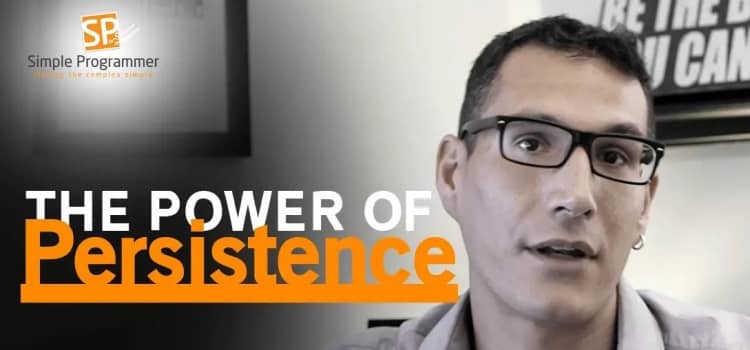Do you want to reach the utmost success in your Software Engineer or Developer career?
Then there’s a number of crucial career skills you'll need to master:
Follow these 27 tips to get the best job you can, achieve mastery over your domain, and surpass your professional and financial goals:
Software Engineering Career Advice for Beginners
When you're just starting out as a Software Engineer, your focus should be on the right mindset for this stage of your career – and on getting as much experience as soon as possible.
Here's some practical advice for keeping your head on straight and finding internships and your first real job as a coding beginner.
1. Don’t Like Coding? Find a No-Code Job
Let’s get this out of the way. It might be that you don’t want a job writing code right now – let alone see yourself in such a career for the rest of your life.
There’s no shame in considering a position in tech that doesn’t require programming!
Why not become a Tech Recruiter, Data Analyst, Quality Tester, or Sales Professional? Not only can these career paths be as interesting as (or for some people, even more than) Software Engineering – but they can make you a decent salary as well.
2. Niche Down to Make More
Specialized programming skills are in high demand. If you’re one of the few who are able to provide them, you’ll be compensated handsomely.
Picking your best niche as a developer starts with doing industry research:
Which tasks are companies looking to have fulfilled, but require special skills, and thus justify high compensation?
Put in the hard work to become an expert at these. Market yourself as a specialist. It won’t be long before you’re offered some great positions – paying way above what you can ever expect to make as a ‘generic’ Software Developer.
3. Win at Internships

If you’re looking to gain your first experience as a professional developer or Software Engineer, look no further than an internship at a tech company.
These internships can often be a direct way to a Junior position at the same company. At the very least they’ll look great on your resume, increasing your opportunities in the future.
One unique strategy for scoring an internship as a programmer is to reach out to your favorite companies who aren’t actively looking for interns. Then sell them on all the benefits an intern (hint: you) could bring to their business.
This lets you show off the positive quality of being proactive – but avoid competing with hundreds going for all the same positions.
4. Use LinkedIn to Get a Job
Speaking of competition: The same applies to programming jobs advertised on LinkedIn – companies are swamped with applications.
You can still score a job on the platform, though – again, by going against the grain. Where others only go for what’s advertised and reach out in generic ways, you network with people of interest and create genuine connections with those working in your field of choice.
Playing a longer game in your job hunt than most are willing to means you’ll be able to reap the rewards they won’t.
5. Apply For Programming Jobs You’re NOT Qualified For

Have you ever been discouraged from applying for a Software Engineering job because of the requirements listed (multiple years of experience, for example)?
You don’t have to be. I encourage you to apply for some Software Engineering jobs even though you’re objectively underqualified. Let me explain.
One secret of programming job openings is that if a prospective employer likes the combination of skills and personality you bring to the table, you still stand a chance.
Even if you lack some experience:
They’ll either hire you for the exact role regardless, or they can turn it into a more Junior position. Either way, you’ve won – only because you tried.
6. Know What to Ask Your Future Employer Before Accepting Any Programming Job Offer
You got the offer? Congratulations – your hard work has finally paid off!
But, before you outright accept the offer for your new position as a Software Engineer, you should ask your employer some crucial questions.
Ask about how they go about fixing bugs, so you can judge if working for them will be a mess. Ask about their guidelines for code quality. Ask about their QA process. Ask how they go about deploying their software.
Scrutinize their answers and be mindful of any red flags.
Before you say yes, make damn sure your new job won’t send you down a path of endless frustration.
7. Avoid First Year Software Engineer Mistakes
A lot can go wrong when you’re just getting started in your first Software Engineering job.
The biggest thing to trip you up is your own ego. As a new developer, your best bet is to stay humble. Also expect to work on your soft skills alongside your technical skills – many newbies ignore how important those really are.
While this humility is key, it doesn’t mean you should neglect your needs. Even if you’re young and enduring as a first-year programmer:
Strive to start working on the work that’s most meaningful to you. And start taking care of your health now, so you’re not hit with burnout down the road – even if right now you feel invincible.
Advancing Your Career

Once you've scored your Software Engineering job, the goal is to make the best of your situation: Negotiate intelligently. Position yourself for any future promotion. Get paid what you're worth.
8. Win at Salary Negotiation
Negotiating well can win you tens of thousands of dollars within a single conversation.
Some effective salary negotiation tactics for Software Engineers include:
- Knowing common industry numbers
- Negotiating from a position of strength (having a referral, a great reputation, and/or other offers lined up)
- Refraining from naming your number
- And making strong counteroffers.
It’s a good idea to practice mock salary negotiations just like you do mock coding sessions before your interview.
9. Stop Being Underpaid
Here’s a shocking truth:
Many people in Senior Developer positions aren’t even good coders.
This means that if you are, you don’t have to be shy about aiming for a six-figure job. As a proficient programmer, Don’t settle for a low-paying position if you’re a proficient programmer – instead, aim high.
Because even with just the technical skills you already have, you’re often able to outperform many higher-salaried developers.
10. Get a Raise or Promotion
If you want to get a raise or promotion in your programming job you need to be proactive about that goal.
Keep improving your skills. Take on more responsibility. Become more valuable inside and outside of your company. And be open, straightforward and specific when communicating your ambitions.
Follow those steps and you should be able to increase your income and influence over time. Still facing resistance despite all your efforts? Then maybe it’s time to open yourself up to better opportunities elsewhere.
Navigating Your Job

As a Software Engineer you need to think strategically – not just in your development work, but also regarding your work environment and the marketplace.
11. Learn What it Takes to Compete with Cheap Programmers
What should someone from a Western country do to be better than and differentiate yourself from programmers from lower-GDP countries who offer their services more cheaply than you can?
The number one area to excel in is your communication with clients. If you take the time to deeply understand their needs, and build a good relationship, you might be able to get a leg up on someone who's relying on his competitive technical skills coupled with low prices to get the job.
Simply put: Care more, communicate better, and you can still win.
If you're from a lower-GDP country yourself, apply the same strategy to be even more in demand.
12. Know What Your Boss Doesn’t Understand About Software Development
In your job as a Software Engineer it’s important to recognize that your boss likely doesn’t understand your development work as well as you do.
Common examples of this are your higher-ups not understanding the gravity of technical debt, putting too much stock into time estimates, or being too skeptical of new technology and possible investments.
Align your work processes and communication with your manager to reflect this – so that you improve your collaboration, nip unnecessary conflict in the bud, and make your own life easier.
Advice for Leaving Your Developer Job

When it's time, it's time. Learn how to master the transition. Whether that's to something completely different – or to bigger and better challenges within Software Engineering:
13. Know If You Should Quit Programming
Have you gotten to a point where you’re not feeling your programming job anymore?
This could mean you should quit, or it could mean you should pivot in one of a number of ways.
It depends on your why for getting a job as a developer in the first place: If it was because you actually loved the work – then try learning a new, related skill. Or apply to another company in the industry. You could even pivot to a different kind of tech job.
On the other hand, if you started just to make lots of money as a Software Engineer, but now you’re too bored with the work:
Can you make money another way? If not yet, then keep working until you find something that pays decently and that you love. But if you already know what it is, then yes – you should quit programming.
14. What To Do When You’re The Smartest Person In The Room
What we’re trying to do on this platform is get you to level up your skills so that you become the most valuable programmer you can be.
Becoming the smartest person in the room leads to new challenges, though:
You might grow disillusioned with your current work environment. People will notice – and even though you’ve objectively become more valuable, might plot to replace you.
If not that, you yourself feel the longing for a position that allows you to keep growing. The bottom line in both cases: It’s time to move on.
15. Know the Signs it 's Time To Leave Your Job

If you’re starting to get depressed because of what’s happening at your job – or you’re overworked from having to fix everyone else’s mistakes – it’s time to plan your escape.
Listen to the signs that it’s time to leave your programming job. Don’t continue being burned out and miserable.
16. How to Leave Your Software Development Job
Now, if you’ve decided to leave your job: Do it ASAP – don’t stay stuck in a situation that’s not serving you anymore.
But take care to do it the correct way. Avoid drama. Don’t kick them while they’re down. Don’t burn the bridges.
The best way to leave your Software Engineering job is to give the standard two weeks notice. Put your honest best effort into training the person who will replace you. And be quiet about everything you know is going wrong at the company – talking about it can only hurt you.
Following this strategy for your exit means you’ll minimize any hard feelings harbored and helps protect your reputation, which is priceless.
Longevity, Unemployment & Restarting Your Career
To make your career as a Software Engineer long and prosperous, and weather the inevitable storms - such as coming back from a forced or voluntary break - make sure you heed the following advice:
17. Let Unemployment Be Your Teacher
Being without a job as a Software Engineer can be an opportunity for you, if you let it.
Take this time to develop yourself personally and professionally.
- To make sure you shine at your next interview, become a master at solving coding problems
- Train up your money management skills
- Start upping your networking efforts ASAP.
These skills will not only serve you well for the rest of your life, they’ll also put you on the fast track to a new job – often one that’s more fun, fulfilling, and highly paid than your old one.
Overcome Your Career Gap
If you’re out of a job for a while, use the time to work on your time management. Learn new techniques and upgrade your skills. Keep going after new opportunities.
Your career gap won’t matter if you’re prepared to work hard during your break and once you start in a new position.
18. How to Restart Your Developer Career after a Long Break
What about if you’ve taken an extended break, for multiple years maybe? Do try and make a comeback – developers are still in demand. Even if you need to start small after a long break from programming, there’s no question it’s worth it.
Start with an honest evaluation of your skills in relation to market demand. If you have gaps to fill in after such a long break, consider taking a course, certification or bootcamp – or at least dive headfirst into free tutorials.
Increase your networking efforts, brush up your resume, prep for interviews, and become determined about your job hunt.
19. Succeed as an Older Developer

Your employability does in fact go down after 35 years old. And most developers are out of the field before 40.
Does that mean it’s hopeless for older programmers?
Not in the least. There’s plenty of examples of those north of 40 still going strong. What it comes down to is staying with the times. Don’t get set in your ways. Always keep learning. Adopt new technologies.
Strive to keep a young person’s mindset, and you can be a successful Software Engineer into your 60s and 70s.
Software Engineer Career Mindset & Strategy Tips
Having a strategy for your programming journey is essential. So is the correct mental attitude. The following tips help you master these elements.
20. Find your Why as a Programmer
If you have a strong why in your work, you’re less likely to burn out.
It’s fine to get into Software Engineering for the financial benefits. But it’s even better if you find the underlying why for getting a programming job:
Living the lifestyle you want, providing for your family, fulfilling your potential in a hard skill, and bringing new things into the world, for example.
21. Find Inspiration from Other Developers’ Life Stories
No matter where you’re at in your Software Engineering journey – there’s someone out there who’s story you can learn from.
There’s programmers who started late and still became successful. There’s those creating the kinds of projects you want to start yourself.
Use other developer’s stories as inspiration to light a fire under you.
You know it’s possible to chase after and reach your goals because of those that came before you – those who once were in a similar situation as yours or who’ve had to overcome even greater challenges than the one you’re facing.
22. Use Powerful Success Strategies

To be a great programmer you need to be almost addicted to hunting for information and learning new things. You need to make good use of the best learning resources out there.
And you need to take all of it and keep practicing until you’ve mastered it. Solve the problems presenting themselves to you, and keep looking for new ones to solve.
Everything is an opportunity to become better.
Finally, one of the most powerful strategies for success as a programmer is to enroll in courses and bootcamps, and find (real-life or online) mentors.
23. Conquer the Path to Kaizen
The Japanese concept of Kaizen (roughly “spirit of continuous improvement”) is useful for any Software Engineer and a part of Agile Methodology.
In your career as a developer, you move through the different stages of Kaizen.
You start in Shu, ‘the state of following’. Then you move on to Ha, ‘the state of innovation’. Until you arrive at Ri, ‘the state of flow’. Strive to contribute to Kaizen each working day, and you’re set to become a true master at your craft.
24. Become a Programming Growth Hacker
Becoming a growth hacker in the field of programming means you’re looking for ways to revolutionize your company by looking for improvement in all areas.
Your coding background will help you with testing and quick iterations. But on top of that, you should become proficient in the skills of copywriting, outreach, design, and project management.
A position as professional growth hacker inside a company not only comes with nice financial benefits – it’s also fulfilling because your efforts will help transform revenue numbers and impact.
25. Overcome Your Impostor Syndrome

Most of us feel impostor syndrome at some point in our programming career. What’s important is you don’t give in to it.
Concentrate on what you’ve already achieved (however little it may be) and the goals you’re working on – instead of paying attention to the perceived superiority of others.
Don’t be afraid to look and act like a beginner. Be that beginner who is immersed in learning, and you’ll find that most people ahead of you are more interested in helping you than in judging you for your lack of skills.
26. Give Up Certain Things
Here’s what to avoid in your Software Engineering career:
- Don’t sacrifice readability for ‘fancy’ code.
- Don’t try to create functionality you’ll only need further down the road – program first what you need for it to work now.
- Don’t be an island. Mingle with other programmers online and accept their help.
- Don’t write code with zero comments. Make it easier for others to understand your code.
- Don’t procrastinate on debugging. It’s essential and should be an integral part of your process.
- Don’t mindlessly copy & paste others’ code. Aim to understand everything that goes into your software.
- Don’t take shortcuts to reach your goal. Figure out each problem you encounter, and be willing to put as much effort and care into solving it as necessary.
27. Cope With the Challenges of Software Development
There’s no question Software Development is a complicated topic – and this complexity can be hard to deal with. The first step to coping with the challenges of development is to simplify as much as possible, to keep things manageable and avoid overwhelm.
Also aim to improve your understanding of the field all the time. Stay ahead of trends so you’re never caught off-guard by the change that’s constantly happening.
If you can do all this while also taking care of your health, you’ll be well-equipped to thrive in this challenging industry.
